- Kenmore refrigerator water filters
- Whirlpool refrigerator water filters
- Samsung refrigerator water filters
- GE refrigerator water filters
- LG refrigerator water filters
- Frigidaire refrigerator water filters
- KitchenAid refrigerator water filters
- Maytag refrigerator water filters
- Kenmore Elite refrigerator water filters
- Estate refrigerator water filters
- GE Profile refrigerator water filters
- Amana refrigerator water filters
- Bosch refrigerator water filters
- Dacor refrigerator water filters
- Electrolux refrigerator water filters
How to replace an air compressor pressure switch
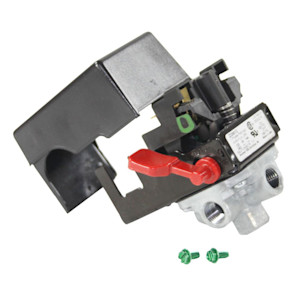
This DIY repair guide explains how to replace the pressure switch on an air compressor. The pressure switch starts the pump motor as the tank empties and pressure drops to the cut-in pressure; the switch stops the motor when tank reaches the cut-out pressure.
Over time, the pressure switch wears out. If the pressure switch won’t start the pump when tank pressure drops below the cut-in pressure or won’t stop the pump when the tank reaches the cut-out pressure, replace the pressure switch with the manufacturer-approved air compressor part.
This procedure works on common Craftsman, Devilbiss, Dewalt, Campbell Hausfeld and Porter Cable air compressors.
Quick links
Video
Instructions
Tools required
Work gloves
Wrench set
Nut driver set
Thread-sealing tape
Repair difficulty
Time required
45 minutes or less
Repair difficulty
Time required
45 minutes or less
Replacing a pressure switch on an air compressor
This video explains how to replace the pressure switch on an air compressor.
Instructions
- 01.
Shut off the electricity and drain the air tank
Unplug the air compressor’s power cord from the wall outlet.
Pull the ring on the safety valve to drain all air pressure from the tank. Wear work gloves to protect your hands.
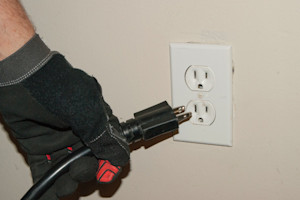
PHOTO: Unplug the power cord.
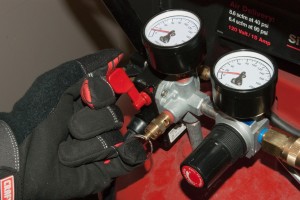
PHOTO: Drain the air tank.
- 02.
Remove the tank pressure gauge
Unscrew the tank pressure gauge and remove it from the pressure switch.
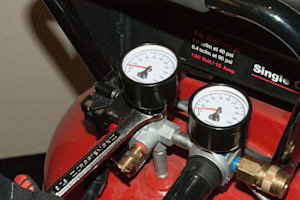
PHOTO: Remove the tank pressure gauge.
- 03.
Remove the pressure switch tube
Unscrew the pressure switch tube fittings from the check valve and pressure switch.
Remove the pressure switch tube.
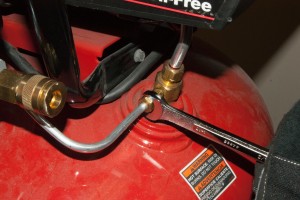
PHOTO: Disconnect the pressure switch tube.
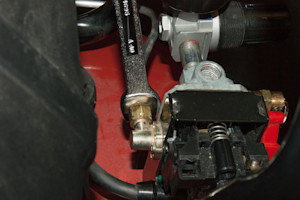
PHOTO: Unscrew the pressure switch tube fitting.
- 04.
Remove the pressure regulator assembly
Unscrew the pressure regulator assembly and remove it from the pressure switch.
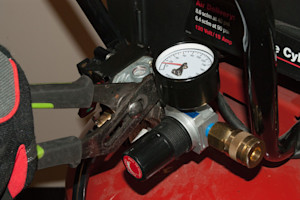
PHOTO: Unscrew the pressure regulator assembly.
- 05.
Remove the pressure switch
Remove the pressure switch cover.
Take a digital photo of the wires connected to the pressure switch for use later when reconnecting wires.
Disconnect the 2 black wires from the pressure switch.
Disconnect the 2 green wires from the pressure switch.
Pull the 2 power cord strain reliefs off the pressure switch.
Unscrew the safety valve and remove it from the pressure switch.
Unscrew the pressure switch assembly from the pipe connected to the tank.
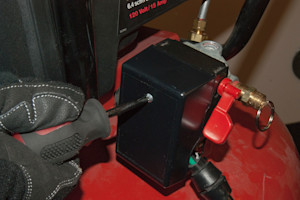
PHOTO: Remove the pressure switch cover.
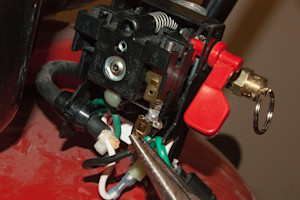
PHOTO: Disconnect the black wires.
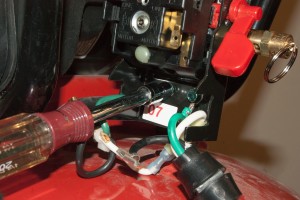
PHOTO: Disconnect the green wires.
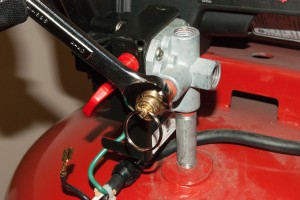
PHOTO: Unscrew the safety valve.
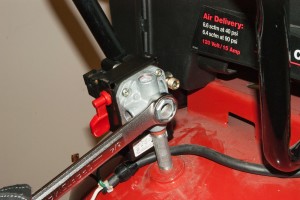
PHOTO: Unscrew the pressure switch.
- 06.
Install the new pressure switch
Apply thread-sealing tape to the tank pipe.
Screw the new pressure switch onto the tank pipe.
Tighten the pressure switch and align the check valve tube fitting.
Apply thread-sealing tape to the threads of the safety valve.
Screw the safety valve into the new pressure switch and tighten firmly.
Remove the new pressure switch cover.
Using your digital photo as a reference, connect the wires to the new pressure switch.
Insert the power cord strain relief into the strain relief bracket.
Reinstall the pressure switch cover.
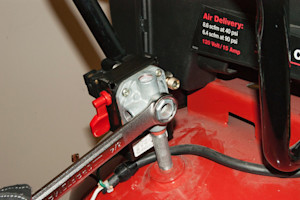
PHOTO: Screw on the new pressure switch.
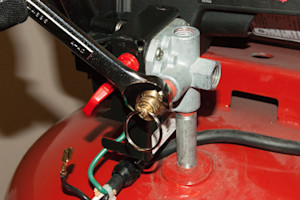
PHOTO: Screw the safety valve on.

PHOTO: Remove the new pressure switch cover.

PHOTO: Reconnect the wires.
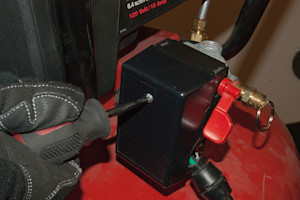
PHOTO: Reinstall the pressure switch cover.
- 07.
Reinstall the pressure regulator
Apply thread-sealing tape to the pressure regulator connecting pipe threads.
Screw the pressure regulator and pipe into the new pressure switch and tighten firmly with the tank gauge fitting facing up.

PHOTO: Reinstall the pressure regulator.
- 08.
Reinstall the pressure switch tube
Reconnect the pressure switch tube to the check valve and the pressure switch.
Tighten the fittings firmly.
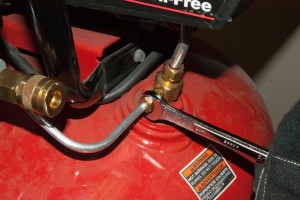
PHOTO: Reconnect the pressure switch tube.
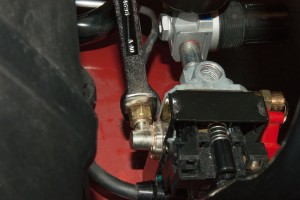
PHOTO: Tighten the fittings firmly.
- 09.
Reinstall the tank pressure gauge
Screw the pressure gauge onto the new pressure switch and tighten the gauge firmly.
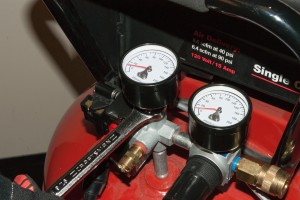
PHOTO: Screw on the pressure gauge.
- 10.
Restore power
Plug the air compressor into the electrical outlet.
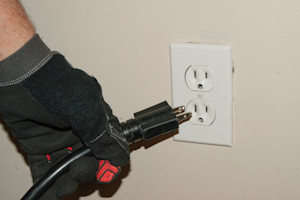
PHOTO: Plug the compressor in.
Warning: Undertaking repairs to appliances can be hazardous. Use the proper tools and safety equipment noted in the guide and follow all instructions. Do not proceed until you are confident that you understand all of the steps and are capable of completing the repair. Some repairs should only be performed by a qualified technician.
Most common symptoms to help you fix your air compressors
Choose a symptom to see related air compressor repairs.
Main cause: bad check valve…
Main causes: tank drain valve open or leaking air, leaky air tank, bad safety valve, worn pump seals, bad pump valve pla…
Main cause: faulty output air pressure regulator…
Main cause: bad air tank pressure gauge…
Main causes: bad safety valve, pressure switch failure…
Main causes: loose air tube fitting connections, bad check valve, faulty safety valve, damaged or corroded air tank, bad…
Main causes: rusted air tank, loose air tube fitting connections, bad check valve, leaky safety valve, bad tank drain va…
Main causes: lack of electrical power, check valve failure, bad pressure switch…
Most common repair guides to help fix your air compressors
These step-by-step repair guides will help you safely fix what’s broken on your air compressor.
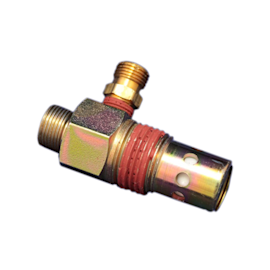
How to replace an air compressor check valve
You can replace a defective air compressor check valve in about 10 minutes.…
Repair difficulty
Time required
15 minutes or less
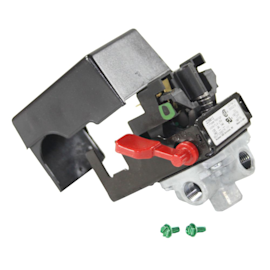
How to replace an air compressor pressure switch
You can replace a broken air compressor pressure switch in about 45 minutes. …
Repair difficulty
Time required
45 minutes or less
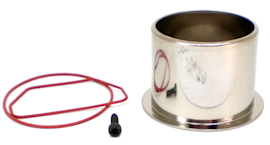
How to rebuild an air compressor pump
If the air compressor won't fill the tank with compressed air, rebuild the pump using these steps in about 45 minutes. …
Repair difficulty
Time required
45 minutes or less
Effective articles & videos to help repair your air compressors
Use the advice and tips in these articles and videos to get the most out of your air compressor.
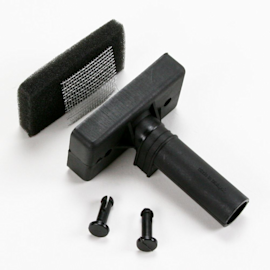
Find out how to reduce air compressor noise.…
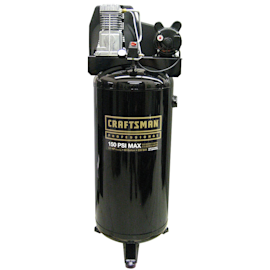
Learn about the possible dangers associated with using an air compressor and how you can reduce the risks of property da…
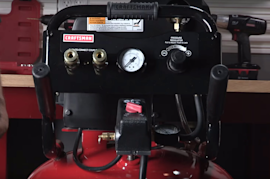
Learn how to maintain an oil-less air compressor for safe and efficient operation.…